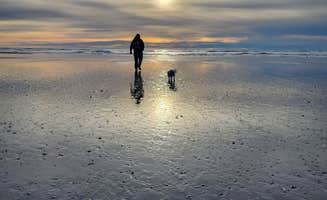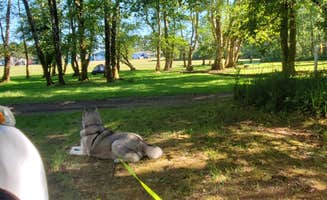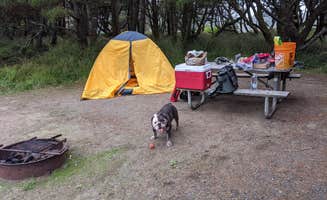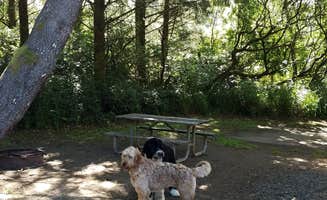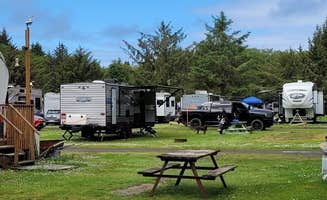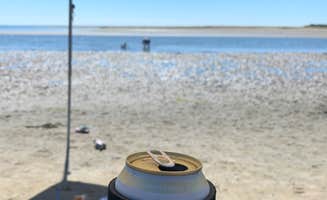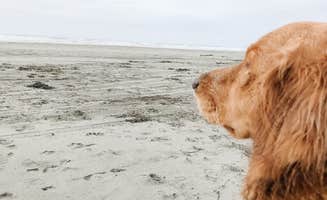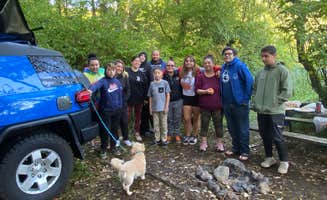Tent and RV camping spaces near Westport sit between 5-30 feet above sea level on Washington's southwest coast. The region receives approximately 70-80 inches of rainfall annually, creating lush coastal vegetation despite sandy soils. Most campgrounds remain open year-round with heaviest use during summer clam digging seasons and lowest occupancy during the November-February rainy period.
What to Do
Beach driving access: At Pacific Beach State Park, campers can drive vehicles directly onto the beach during certain seasons. "The beach is very long and uncrowded, although they allow driving on it," notes John G., who recommends the tent section of Twin Harbors State Park Campground for better beach access than the RV areas.
Horseback riding: Schedule beach rides leaving from JB's RV Park area. "Horseback riding along The Ocean was a dream come true! One happy girl!!" reports Carla S. about her experience at Pacific Beach State Park Campground, where riders can access expansive shorelines.
Kite flying: The steady coastal winds make Ocean City State Park ideal for this activity. "Tons of kites flying through the summer days, it's beautiful," writes Dawn about Pacific Beach, where the open beach areas provide ample space even during busy summer weekends.
What Campers Like
Forest camping options: Tent areas typically offer more seclusion than RV sites throughout the region. "The tent sites were a little more wooded and secluded," notes Tiphanie B. about Ocean City State Park Campground, which offers alternatives to the more open RV areas.
Cycling amenities: Dedicated bicycle camping areas exist at certain parks. "There was a dedicated area for cyclists which just so happened to be right next to the beach," reports Scott B. about Twin Harbors State Park, providing more direct beach access for human-powered campers.
Campsite selection: Ocean Breeze RV Resort features exceptional site variety. "There are sites in open areas, some cut into the forest, and some completely covered by trees. We found tons of wild blackberry bushes near our site," explains Zach H. about Ocean Breeze RV Resort, noting the unusual privacy between sites.
What You Should Know
Site spacing considerations: RV sites typically offer less privacy than tent areas. "The RV spots with hookups are lined up next to each other, very little space between," writes John G. about Twin Harbors, contrasting this with the tent area he preferred even when using a camper.
Seasonal fluctuations: Campgrounds experience significant weather variations. "We tent camped at site 299 in mid-May. The campground was pretty full, but site 299 was the most secluded, so we got the most solitude here," reports Kristen D., also noting that "the mosquitos were pretty bad" during this time.
Beach trail access: Most coastal campgrounds connect to beaches via dedicated trails. "The dunes between the campground and the beach make for a nice walk and an awesome place to explore and for kids to play," describes Scott M. about Grayland Beach State Park Campground, highlighting both recreational and access benefits.
Tips for Camping with Families
Playground options: Larger facilities offer multiple recreation areas. "Several playgrounds, a large pool, and other facilities that were all open," reports Zach H. about Ocean Breeze RV Resort, making it suitable for extended family stays despite its lack of sewer hookups.
Noise considerations: Campsite layouts affect the family experience. "We unfortunately were surrounded by people with small children that ran around the campground climbing and shaking the trees, riding and falling off their bikes/scooters, screaming and crying," writes Mercedes D. about Twin Harbors, recommending early morning beach walks for quiet time.
Pet-friendly amenities: Most campgrounds accommodate dogs both at sites and beaches. "Most campers leave dogs off leash on the beach," explains Dawn about Pacific Beach State Park, where pet friendly camping near Westport includes both controlled campground areas and open beach spaces for exercise.
Tips from RVers
Hookup positioning: Utilities at some parks require extra planning. "We had to run to town because the water and power hookups are ridiculously far away from where they sit on anyone's trailer or RV," warns C M. at Twin Harbors, recommending extension cords and longer hoses.
Site selection strategy: RV campers should consider their specific needs when booking. "Large, paved, level, private campsites," describes Laurie W. about Grayland Beach State Park, specifically mentioning site #89 with 50-amp service but no sewer hookup.
Dump station access: Plan for parks without full hookups. "No sewer hookups! In a 300+ site campground I was shocked to learn they had no option for sewer. They have 6 dump stations in 2 locations instead," notes Zach H. about Ocean Breeze, recommending planning tank usage accordingly.


